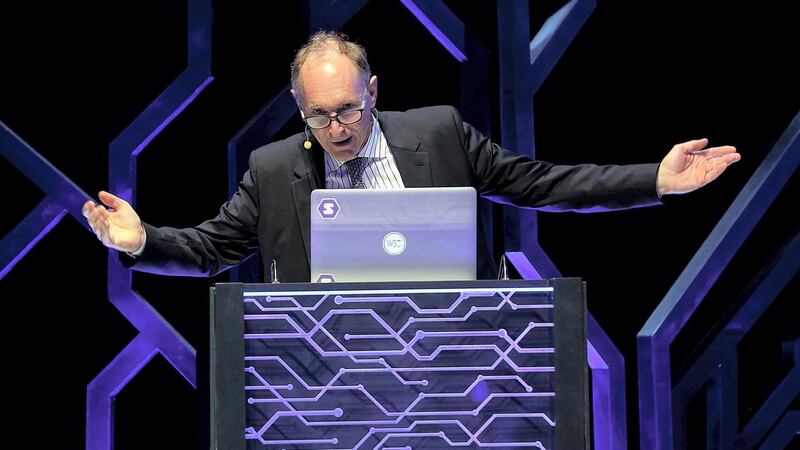A cabal of internet companies have become too powerful and data-sharing scandals have forced a tipping point towards how the internet will be used in the future, according to World Wide Web inventor Sir Tim Berners-Lee.
The computer scientist used his keynote speech on Day 2 of Gitex Technology Week to announce the latest development in his Solid project at the Massachusetts Institute of Technology.
Through new start-up company Inrupt Inc, Mr Berners-Lee promises a restructuring of the internet, with greater privacy and more integrity on how personal data is used by decoupling Solid applications from the data they produce.
“Imagine a world where you have control of where your data goes and who has access to it,” he said. “Solid uses web technology in a way that it gives people complete control of their data.
“Privacy will be turned on its head. It is about users having choice about where they store their data, and about what app they use to manage that data to restrict who has access to it, and when.
“It is about openness and freedom, and the power to share any piece of data with anyone, or no one.
“It is empowering and will bring down the silos of data stored with vast social media companies that people have been quietly frustrated about.”
If globally adopted, Mr Berners-Lee claims the switch could be revolutionary and put control of online personal information back into the hands of internet users.
Internet giants are already beginning to take notice of concerns over data sharing and privacy in the wake of unsolicited use of personal data such as the Facebook-Cambridge Analytica scandal where information from millions of people was harvested for political purposes.
Google recently announced it was shutting down its long-shunned Plus social network for consumers, after its disclosure of a flaw that could have exposed some personal information of up to 500,000 people.
In July, Google joined Facebook, Microsoft, and Twitter to announce a new standards initiative called the Data Transfer Project, designed as a new way to move data between platforms.
The project will let users transfer data directly between services without needing to download it and then re-upload information.
_____________________
Read more:
'Nasty' social media needs reining in, Sir Tim Berners-Lee tells UAE summit
The world is on a web learning curve
Facebook says security breach affected about 50 million accounts
______________________
During his keynote address, Sir Tim spoke of how the internet has changed beyond all recognition from its original incarnation as a place to encourage democracy, science and humour.
“People were quite utopian about the internet in its early form, and there were lots of ways in which it did generate value,” he said.
“Ordinary people could web log about their thoughts and interest to create a new genre of writing. “They were on the same level as big mainstream news organisations.
“Blogging wasn’t driven by advertising revenue as it is now, just the kudos of knowing there were other people who enjoyed what other people were writing about.
“People talk to me about fake news, and they are worried about click-bait with blogs driven by advertising as the only way of rewarding someone for their writing.
“Most people spend their time in just one social network, so their experience is not about going between different links choosing different blogs that may interest them, but an environment that is controlled by that company.
“Even if that company puts a lot of effort to control that online environment, we are losing innovation.”







